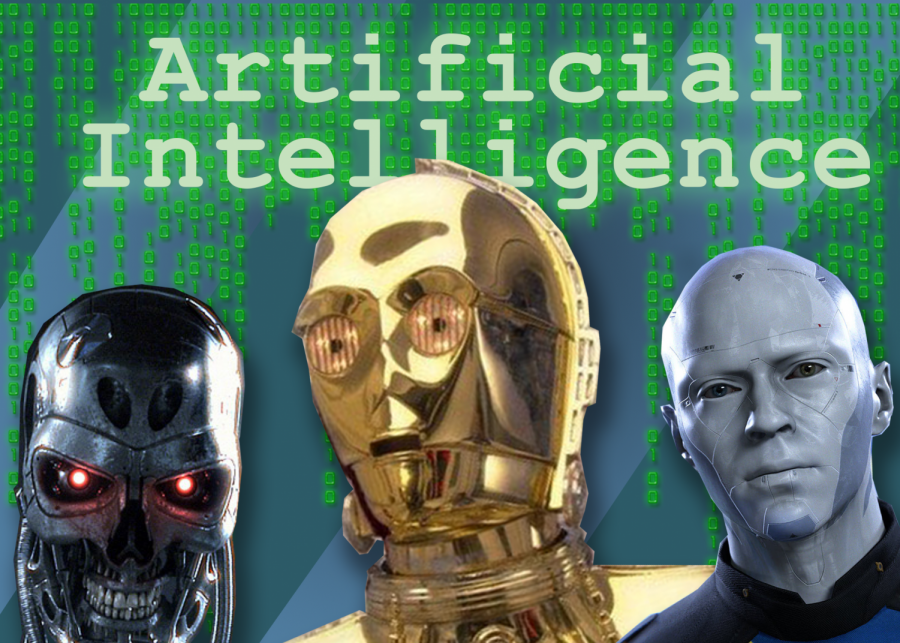Life in a Machine: The Future of Artificial Intelligence
Fiction has long been depicting artificial intelligences in the form of robots, but there are many forms that it could take in the future.
When you hear the term “artificial intelligence,” what do you imagine? For many, they think of their smart assistants, such as Siri or Alexa. However, artificial intelligence has infiltrated many parts of our digital lives, from search engines to social media. The technology around artificial intelligence is rapidly developing, and there is no doubt it will be taking on an even more integral role in our futures.
But before we start, what even is artificial intelligence? Artificial intelligence, or AI, is difficult to put into one definition. DataRobot CEO Jeremy Achin describes it as “a computer system able to perform tasks that ordinarily require human intelligence.”
So where do we see AI in our everyday lives? Chances are, you see it in more forms than you would expect. Some of the most common places where AI is used are in advertisements, social media algorithms, search engines and even the camera app on your phone. Artificial intelligence is being used by developers to simplify and advance software that performs everyday tasks.
One simple example of this would be Google. When you type something into Google, it doesn’t have a preset list of results for any specific search term. Instead, it uses its systems to determine what results will best satisfy the user. Over time, these systems of machine learning and artificial intelligence have improved vastly.
Many of the types of artificial intelligence that we encounter today would be known as “narrow artificial intelligence.” Narrow AI is typically designed with a very specific task in mind, and doesn’t come close to replicating the power of the human mind. However futuristic these systems seem, there is a new type of artificial intelligence that might be more reminiscent of a sci-fi movie than any kind before. Artificial General Intelligence (AGI) is the concept of artificial intelligence that can reason, calculate and perform tasks based on a general level of intelligence.
In July of this year, a new system of AI was developed by OpenAI, the leading developer in AGI technology, which has received over $2 billion dollars in investments from the likes of Elon Musk, Peter Thiel and Microsoft. This system is called GPT-3, and its development is arguably the largest advancement in artificial intelligence history.
GPT-3 is eerily reminiscent of the type of AI that you would see in a science fiction movie like Star Trek. One effective demonstration of its power is this interview with a speech bot version of the AI, in which you can see it give snarky answers, come up with jokes and program a javascript function from scratch. In this interview, when asked, “What do you want humanity to know about you?” GPT-3 responded,
In another demo from OpenAI, artificial intelligence creates full-length songs from scratch based on popular genres.
The current applications of OpenAI’s GPT-3 are quite limited. However, that has no implication for a limit to the technology over time. The company has deliberately limited access to the system, which likely has helped prevent malicious use of its powerful capacities.
The development of GPT-3 and it’s powerful advances further reinforces the suggestion of exponential growth in AI technology. Given these advances, an important concept to note is the technological singularity. This concept is a hypothetical scenario in which artificial intelligence would begin to develop its own power at an exponential rate, eventually resulting in a supernatural force of intelligence and power. GPT-3 itself predicts that this will happen around 2042, but some think that it may happen earlier.
So given all of this, what is the future of artificial intelligence? Although there is no way to accurately foresee the impact it will have, we can try to make some predictions.
Imagine a world in which business decisions are led by an all-considering, ultra-smart artificial intelligence. A world in which traffic is solved by an AI that controls a massive network of self-driving cars. A world in which every person has a personal assistant that is aware of their every preference and personality trait.
On the contrary, any system that powerful will inevitably end up in the wrong hands. What happens when a malicious hacker uses AI to infiltrate the online world? What if someone could use AI to come up with a system to ensure that they maintain political power?
The future of AI has the potential to be terrifying and disastrous, but also has great potential to bring the world to a new era of peace and comfort. Ultimately, it is up to us to direct these systems in a productive direction, and hopefully prevent any sort of robot uprising.

Keegan Jack is a senior at Boulder High School with, among other things, a passion for the combination of media and information. It was this very passion that inspired him to pursue working for The Owl. He loves exploring the wonderful nature of Colorado and trying to capture its beauty through the art of photography. He also enjoys various other hobbies, such as illustration, playing cello, and boxing. Keegan prides himself on being an effective communicator, but this sometimes means he ends up trying to convince people about things that they don’t want to change their mind about, such as his belief in the ambiguity between the types of grapes. Although the COVID-19 virus has certainly been...



A'esha Miracle • Dec 15, 2020 at 5:51 pm
This was a very interesting article. The allure of AI is very enticing and it definitely has the potential to grant us great ease and peace, like you mentioned. Although I do like that you added the flip side, that AI could also bring unknown threats and dangers. It’s kinda interesting that the only thing we see in movies and tv shows, about AI and robots, is that they take over the world or destroy humanity. It would be cool to see it from the other way around, where AI simply creates a world of more ease and relaxation, though I suppose that doesn’t make for an exciting story. Anyway, I really enjoyed this article and you did a really good job!
Luke Schafer • Dec 14, 2020 at 6:04 pm
This was a very good piece. There is a Netflix original called “The Social Dilemma” about some of the topics you covered. it was about how internet services are free because there is an AI in charge of putting what it perceives as the most effective advertisements in order to keep the user interacting with the service or app. I really liked how you presented this utopia that could be created by AI, and then followed up with the alternative and how that could lead to a bad situation.
Morgan Srednick • Dec 11, 2020 at 4:12 pm
Thank you for such an informative and interesting article! I knew very little about this concept before hand, and your article was easy to follow while being incredibly factual and illuminating. I was definitely the person who thought of devices such as Siri and Alexa upon hearing the phrase artificiaI intelligence, and I wasn’t aware that many other forms of our daily technology would fall under that category. It’s crazy to imagine the ways artificial intelligence will control and change our lives in the future. It’s easy to see the future of this technology being detrimental and rather frightening but I can also imagine the era of peace and comfort it could possibly bring about, like you mentioned.